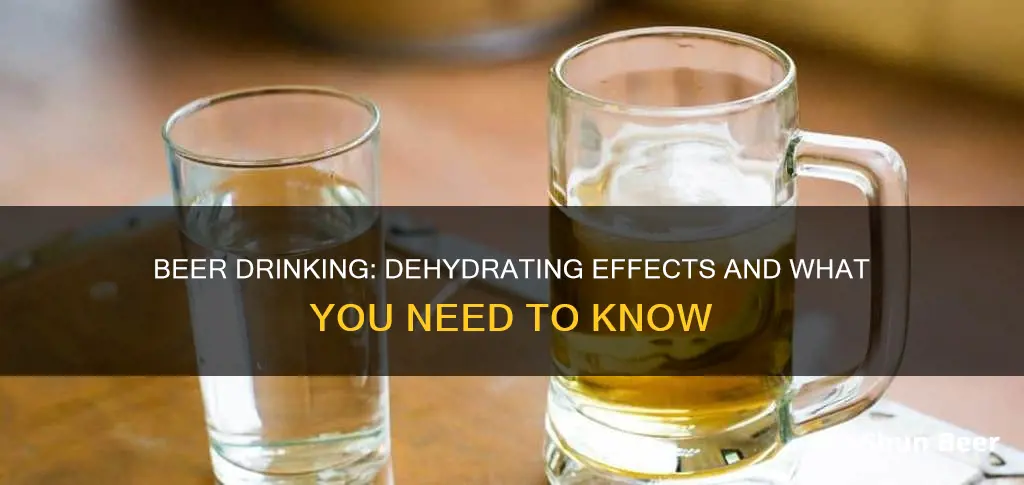
Beer is a popular alcoholic beverage that has been enjoyed for centuries. It is made up of water, barley, hops, and yeast, and contains electrolytes and phyto-nutrients. While beer can be refreshing, it is also a diuretic, which means that it will make you urinate more than you usually would. This can increase the risk of dehydration, as your body loses fluids.
The higher the ABV (alcohol by volume) of a beer, the more your body will have to work to rid itself of the alcohol. However, some studies suggest that beers with a low alcohol content have a negligible diuretic effect, meaning that they can be as hydrating as water.
To prevent dehydration when drinking beer, it is recommended to have a glass of water with every beer and to drink in moderation.
| Characteristics | Values |
|---|---|
| Does beer dehydrate you? | Beer is a diuretic, which means it causes you to urinate more than you usually would. This can increase the risk of dehydration. |
| What causes dehydration? | Alcohol inhibits the release of vasopressin, an anti-diuretic hormone that is released when our concentration of electrolytes rises above a certain level. |
| What can you do to prevent dehydration? | It is recommended to have a glass of water with every beer you drink. |
| Are there less dehydrating alternatives? | Yes, ginger beer contains no ABV or added yeast, so it has none of the diuretic properties that regular beer does. |
What You'll Learn

Beer is a natural diuretic
The diuretic effect of beer is influenced by its alcohol content. Beers with higher alcohol percentages tend to have a stronger diuretic effect. For example, a study found that after exercise-induced dehydration, participants who consumed a full-strength 5% beer had significantly higher urine output compared to those who drank a non-alcoholic or low-alcoholic beer (2% or lower). However, it's important to note that the amount of alcohol consumed and the level of dehydration also play a role in urine output.
While drinking a single beer may not necessarily dehydrate you, consuming excessive amounts of beer in one sitting can lead to dehydration. This is because the combination of excess liquid intake and the body's increased urination can leave you feeling thirsty and depleted of fluids. Therefore, it is generally recommended to have a glass of water with every beer to help maintain proper hydration.
Beer and Braces: Ceramic Care and Drinking
You may want to see also

Alcohol dehydrates your body
Alcohol is a diuretic, which means it makes you urinate more than you usually would. This can increase the risk of dehydration as your body loses fluids. Alcohol inhibits the release of vasopressin, an anti-diuretic hormone that is released when our concentration of electrolytes rises above a certain level. Without this hormone, the kidneys cannot reabsorb extra fluid, so you lose more fluid.
The higher the alcohol content in your beverage, the more of a diuretic it is. So, a beer with 7% alcohol content will be more dehydrating than a beer with 3% alcohol content. The amount you drink also matters—if you drink several beers in quick succession, you will become dehydrated more quickly.
Beer is made up of water, barley, hops, and yeast, and contains electrolytes and phyto-nutrients. A study published in The Journal of Applied Physiology found that beverages with low alcohol concentrations have "a negligible diuretic effect" when consumed in a state of exercise-induced dehydration. This means that hydrating with water or a low-alcohol beer (around 2% ABV) is effectively the same. However, a higher alcohol content can make your body work harder to process and filter out the alcohol, leaving you feeling thirsty and dehydrated.
To prevent dehydration when drinking beer, it is recommended to have a glass of water with every beer. This will help to replace any fluids lost through urination and slow down the increase in blood alcohol levels.
Does Helium-Infused Beer Really Work?
You may want to see also

Losing fluids can offset electrolyte levels
The diuretic effect of alcohol is related to its impact on vasopressin, an anti-diuretic hormone. When your electrolyte levels rise, vasopressin is released to help your body retain fluid. However, alcohol inhibits the release of vasopressin, resulting in increased urine production. This means that your kidneys are unable to reabsorb extra fluid, leading to more dilute urine and greater fluid loss.
The higher the alcohol content in a beverage, the stronger its diuretic effect. Therefore, drinks with lower alcohol content, such as beer, are generally less dehydrating than drinks with higher alcohol content, like liquor. However, it is important to note that drinking too much beer in one sitting can still lead to dehydration. This is because the excess liquid, combined with your kidneys working harder to filter out the alcohol, will leave you feeling thirsty and dehydrated.
To maintain proper hydration while drinking beer, it is recommended to have a glass of water with each beer. This will help replace the fluids lost through increased urination and reduce the risk of dehydration. Additionally, drinking slowly and alternating between alcohol and water can also help prevent dehydration.
Beer and COPD: What's Safe to Drink?
You may want to see also

Higher ABV makes your body work harder
The higher the alcohol content in your drink, the more your body has to work to rid itself of the alcohol. Alcohol is a diuretic, which means it increases urine production. This is why people often need to urinate more when drinking alcohol.
The higher the ABV, the more your kidneys have to work to filter the alcohol out of your body. This can lead to dehydration, as your body loses fluids. It can take up to six hours for alcohol to leave your system, so drinking too much in one sitting may cause dehydration.
Beer, in general, has a higher alcohol content than wine or liquor. The average beer has an alcohol content of 3-7% per 12-ounce serving, while a 5-ounce glass of wine can have up to 14% alcohol content. A single shot of liquor can contain up to 70% alcohol.
Therefore, it is important to drink in moderation and to stay hydrated when consuming alcohol. Drinking water or other non-alcoholic beverages can help reduce the risk of dehydration. Additionally, avoiding other diuretics, such as soda and caffeine, can help reduce dehydration symptoms.
So, while beer may be a refreshing and enjoyable beverage, it is important to be mindful of its alcohol content and to consume it in moderation to avoid dehydration.
Beer and Cinarizina: A Safe Mix?
You may want to see also

Drinking water with beer can prevent dehydration
Beer is a diuretic, which means that it causes you to urinate more than you usually would. This can increase the risk of dehydration as your body loses fluids. Alcohol also dehydrates your body as it increases the urine produced by your kidneys to process and filter it out of your body.
However, drinking water with beer can help to prevent dehydration. As a general rule, it is recommended to have a glass of water with every beer you drink. This is because the water can help to replace the fluids that are lost through urination, and it can also slow down the absorption of alcohol into the bloodstream.
A study published in The Journal of Applied Physiology found that beverages with low alcohol concentrations have "a negligible diuretic effect" when consumed in a state of exercise-induced dehydration. The study suggested that hydrating with water or a low-alcohol beer (around 2% ABV) is effectively the same. The study also found that a 4% ABV beer had the same hydrating qualities but just took longer to achieve the same results.
Another study found that after mild exercise-induced dehydration, a moderate amount of non-alcoholic beer, low-alcoholic beer, full-strength beer, water, or an isotonic sports drink all failed to replenish depleted fluid losses to the same extent. However, the study also found that the combination of a moderate amount of beer, with varying alcohol content, enough water or electrolyte- and carbohydrate-rich beverages, and salty foods might improve rehydration.
So, if you're planning on drinking beer, especially after exercise, be sure to drink water as well to help prevent dehydration.
Vegan Beer: What's in Your Pint Glass?
You may want to see also
Frequently asked questions
Beer is a diuretic, which means it makes you urinate more frequently. This can lead to dehydration if you don't replace the fluids you lose. In addition, alcohol stays in the body longer than water and can take up to six hours to leave your system.
Beers with lower alcohol content are less dehydrating. A beer with 2% ABV or less may have the same hydrating qualities as water.
It is recommended to drink a glass of water with every beer. Drinking water will help to replace the fluids lost through urination and prevent dehydration.
Ginger beer is a healthy alternative to regular beer. It contains no alcohol and is not fermented, so it does not have the same diuretic properties.







